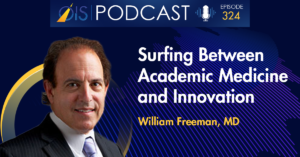Surfing Between Academic Medicine and Innovation, With Dr. Bill Freeman

Click here to watch the video version of this podcast.
William “Bill” Freeman, MD, has been at the forefront of intraocular drug delivery for more than 30 years, and he’s done so while also treating patients and teaching the next generation of eye surgeons.
From sunny University of California San Diego, where he serves as distinguished professor, vice chair of ophthalmology, and director of the Jacobs Retina Center, Dr. Freeman pioneered new techniques and technologies now common in the field.
In the early 1990s, at the height of the AIDS epidemic, he developed a surgical technique to repair detached retinas, a common complication of the cytomegalovirus (CMV) retinitis he was seeing in so many HIV/AIDS patients. He also found that he could repeatedly inject drugs into the eye with little-to-no systemic side effects.
Dr. Freeman’s research not only pioneered a new way to treat CMV retinitis; it also led to a method of ocular drug delivery that’s now the standard of care: intravitreal injections.
With the support of ongoing National Institutes of Health funding, Dr. Freeman continues to look at new ways to deliver drugs. Through Spinnaker Biosciences, which he cofounded with fellow UCSD professor, Michael Sailor, PhD, Dr. Freeman is exploring nanopores as the method of a customized, long-lasting treatment for wet age-related macular degeneration.
The other company he cofounded, Nanovision Biosciences, focuses in part on developing an implantable nanotechnology device for patients with degenerative retinal disorders.
With retina specialist (and mentee) Firas Rahhal, MD, Dr. Freeman discusses his career in academics, his relentless pursuit of innovations, and why San Diego is ideal for windsurfing and kitesurfing.
Listen to the podcast to hear Dr. Freeman and Dr. Rahhal discuss:
• Dr. Freeman’s early career goals, including why he chose to specialize in uveitis and why academia is a good fit for him.
• What it takes to do well in academics. (Hint: Location matters.)
• How his work with HIV/AIDS patients led to developments that are now the standard of care.
• The state of Spinnaker Biosciences and the science behind nanoporous silicon, which is key to its long-lasting delivery system.
• His thoughts on polymers used in ocular drug delivery.
• The global medical, and scientific contributions that have emerged from Dr. Freeman’s retina fellows.
Click “play” to listen.
